After three years of a long-distance relationship, Atlas trader Susan Heller Evenson, along with roaster clients, joyfully reconnected with coffee producer partners in Uganda, Rwanda, DR Congo, and Burundi.
Our first stop was Uganda, which offers a gamut of coffee qualities and types. From commercial-grade DRUGARS (Dried Uganda Arabica) or WUGARS (Washed Uganda Arabicas); natural-process Robusta; or specialty-grade, certified, fully-washed Arabicas picked upwards of 1800 MASL, Ugandan coffee producers are offering, and at a competitive price.
Ibero Uganda
We kicked off our visit with a stop at Atlas’ NKG sister company, Ibero Uganda, which has its offices and dry mill in Kampala. During our visit, one truck was arriving to offload parchment, while another was being loaded with export-ready green coffee. Uganda is also one of four coffee-producing countries that are part of NGK’s BLOOM initiative, a farmer sustainability program through NKG that offers pre-harvest financing, access to inputs, mobile money advances, and professional assistance in agriculture. While right now Bloom in Uganda is limited to its Robusta offerings, we’re hopeful that we’ll see some Arabica BLOOM coffees soon.
ACPCU
From Kampala we drove west to visit Ankole Coffee Producers Coffee Union Limited (ACPCU), a Cooperative Union established in 2006 focused exclusively on natural-process Robusta coffee. Today, ACPCU exports over 200 containers of Fairtrade Organic and Fairtrade Robusta annually, has 26 primary societies/cooperatives (with 9 additional hoping to join in 2023), and over 10,000 members (with around 30% women).
The cooperative’s self-reliant and business-minded approach has been a huge part of its success today. At one point, their only furniture consisted of one bench as they worked to pay their bills and build equity. When we visited, they were in the middle of a meeting with their 40 agricultural extension officers and brought that famed bench to the meeting as a reminder of their humble beginnings and their values. The focus of the day’s particular meeting was on climate change mitigation and adaptation techniques.
Robusta trees have a much higher yield on average than their Arabica counterparts, with the average Robusta tree at ACPCU producing 30kg of cherry per tree (or around 5.5kg of green export-ready coffee per tree), vs Arabica in the region, which might provide only up to 7kg of cherry per tree (a little over a kg of export-ready coffee) under optimal conditions. Most ACPCU farmers own about a ½ acre of land or about 225 trees.
ACPCU offers free seedlings to farmers, parchment/husks as well as training for how to make manure, a youth program focused on stumping coffee trees (key for long-term coffee-tree health and productivity), and the opportunity for farmers to cup their coffee in the lab. Two of the five board members are women, and every committee must have at least one woman.
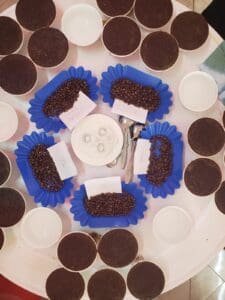
ACPCU's cupping lab.
The facility is impressive, with above and underground water tanks to store water, a color sorter at the mill, dozens of additional drying tables at the mill, and even a silo. Since the cooperative focuses solely on naturals, a wet mill is not needed. Cherries are picked, dried on raised beds for approximately 14 days, and then brought directly to the mill where the pre-cleaner removes dust, the coffee goes through a destoner, screen-size grader (12+, 15+, 18+ are standard Robusta screen sizes in Uganda), gravity table to remove lighters coffee, color sorter (if a coffee is too light a color, it usually means it is less dense). The color sorter removes around an additional 2-3% of the coffee, and then the coffee is prepared for export.
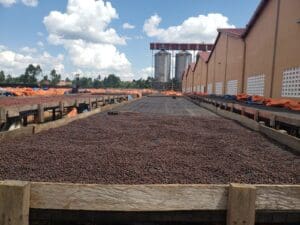
Cherry drying on raised beds at the ACPCU mill.
Currently Atlas only purchases coffee from ACPCU back-to-back for specific clients, but after seeing ACPCU’s facilities and—more importantly—the strength and values of its people—we look forward to a long partnership moving forward.
Endele
From ACPCU we continued westward toward Queen Elisabeth Natural Park, where two young Uganda entrepreneurs decided, shortly after college, to start working with farmers in their community of Rubiziri to process high-quality natural arabicas. We met with Manzi Junior Francis (production manager), Kibogo George Wilkins (operations manager), and Wokadala Elly Samuel (Sourcing and Sustainability manager), who shared about their company’s history: a couple of years ago they found and rented a storage facility in Rubiziri, receive pre-harvest finance from Ibero to purchase 18 large drying beds and work with around 400 core farmers and 40 seasonal workers to source and dry arabica cherry in the area. They then send day lots to Ibero Kenya’s lab (which processes up to 4,000 coffee samples/week during high season so has the expertise and capacity to handle), along with how much volume each lot represents, and then the Ibero lab, based on cupping profile and lot volume, will suggest which lots to combine to make a container.
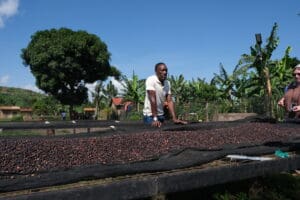
Team discussing sourcing for Atlas's profile coffee Endele, a Natural Uganda.
Samuel, George, and Manzi are closely tied to their communities, visiting farmers in the off-season, and are able to offer farmers advance payment (commonly used to pay school fees due in January), then farmers can pay back the pre-harvest loan in cherry delivery.
Atlas has purchased a “DRUGAR plus” (nicer natural arabica, dried on raised beds) from Uganda for years through a different large exporter in Uganda, but struggled with quality challenges. Enter Ibero Uganda and Sam, George, and Manzi, and the first delivery of our “Endele” profile exceeded every expectation. For anyone looking for a fruit-froward natural to use as a single-origin espresso or blend component, Endele just might fit the bill. Please reach out to your Atlas rep for samples.
BJCU
We rounded out our time in Uganda with a visit to Bukonzo Joint Cooperative Union, whose headquarters are in Kyarumba, the heart of the Rwenzori mountains and about an hour west of Kasese.
We had the interesting opportunity of cupping six coffees: two new crops, two from the 2021/22 harvest, and two from the 2020/2021 crop to see how coffee qualities age over time. The best news was the new-crop coffees were delicious. Cupping the 2020/21 crop coffees, which tasted more tired than anything else, was a good reminder that coffee is an agricultural product!
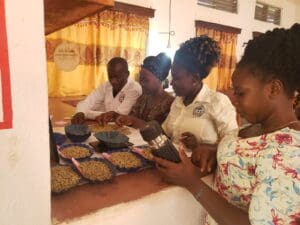
The BJCU QC staff green grading samples.
BJCU currently has 1,465 farmer members from 3 primary cooperatives (Mughete, Karuhgabira, Nyabisusi) and 11 washing stations (Kyalhumba, Kitabona, St. Goret, Kihungu United, Katherere, Kyondi Imbibo, Karughabira, Buhuhira Main, Nyasisusi, and Kaswa), and has faced tremendous competition in the Kasese region from certain multinationals in recent years. These groups will purchase cherry at any quality and pay high prices, but often without any consistency, additional services, second payments, agricultural support, community engagement, or long-term commitments. But when the economy is tough, and farmers the world over struggle to earn decent wages, let alone living ones, it’s no wonder that many sell part of all of their cherries to the highest payer.
BJCU is not unique in facing these challenges and has continued to focus on finding ways to strengthen its Union – from financially supporting a primary cooperative with a lack of water by pitching in for a large water tank (so the cooperative doesn’t as often need to rely on using motos to fill up jerry cans when a period of dry weather occurs during the harvest) to using their Fairtrade funds to support the local maternity by providing beds and tools, and the local secondary school’s library with desks, shelves, and chairs.
Last year, BJCU also started a larger-scale organic compost operation near their dry mill, where they combine grasses, animal droppings, pulp, husks, worm casings from their worm bins, and even a black soldier fly project, as black soldier flies have been known to increase soil nutrients. BJCU also has an incentive program where a farmer can be paid a slightly higher price if he or she waits a short time for payment vs being paid immediately. Some farmers prefer this, not only for the higher price/kg of cherry they are paid but also because it acts as a small savings account.
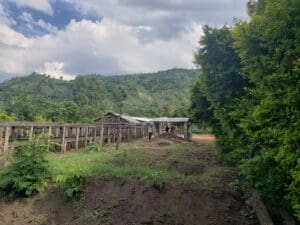
BJCU's Nyabisusi Washing Station.
More than any other cooperative I’ve visited, BJCU utilized the GALS (Gender Action Learning System) tools in all their activities – from personal and household-level vision journeys, to 5-year-old Union-level vision plans. During this visit, BJCU leadership showed us the five-year vision journey the cooperative had created in 2020 at their Annual General Meeting. When we visited the Nyabasusi washing station, two of their members, Beatrice and Jessica, showed us that their coffee submitted to the coffee competition had scored 85.3 in 2022 and 85.8 in 2023. In 2022, BJCU bought a new huller with an improved grader and now has a color sorter. Even amid extraordinary challenges – from extreme drought and floods to competition from other buyers to lack of water to additional logistics required to get their shipments from western Uganda to the port of Mombasa – BJCU is keeping its standards high.
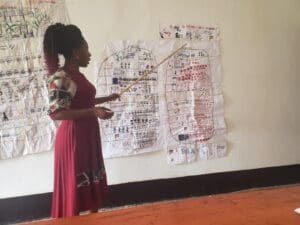
A GALS lesson.
We currently have freshly landed lots available on our offering list. Please reach out to your rep for specific cupping notes or a sample!